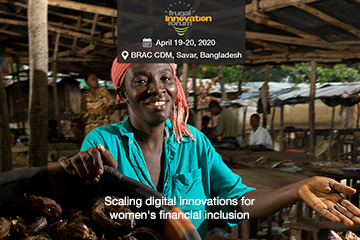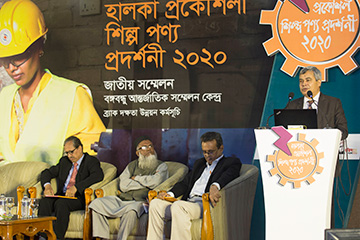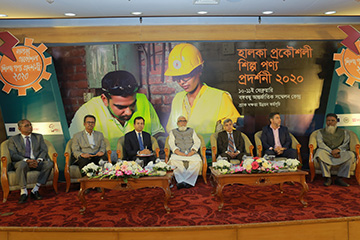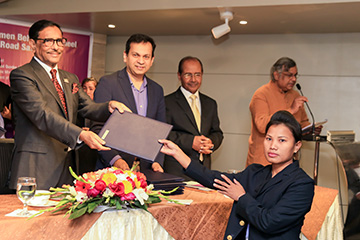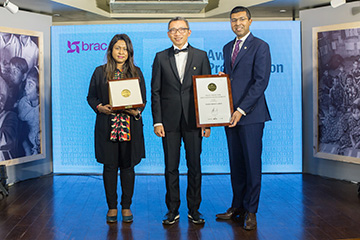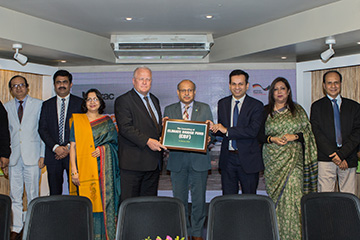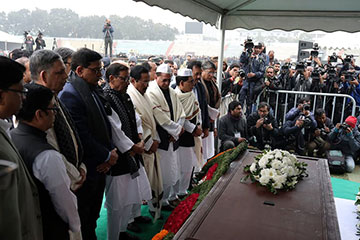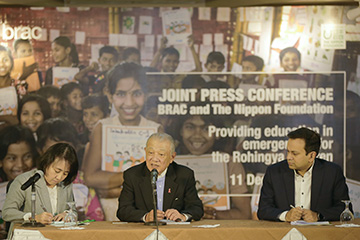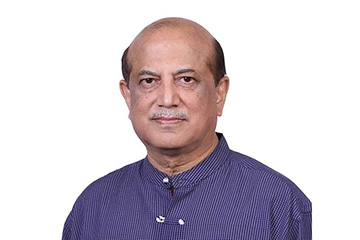
News (832)
Registration for Frugal Innovation Forum 2020 is open now

Registration for 7th Frugal Innovation Forum began from 20 February (Thursday). This year’s conference will be held from 18 April until 20 April at BRAC CDM, Savar, Dhaka. Interested participants must register by 15 March 2020.
The forum, organised by BRAC, will explore digital solutions to the challenges in financial inclusion. The theme for this year is “Scaling Digital Innovations for Women’s Financial Inclusion”.
The three-day conference will connect practitioners, thinkers, researchers, policymakers and financial ecosystem partners from Global South. There will be interactive panel sessions, debates, innovation pitch and networking sessions on how we can find simple solutions to the many challenges that impede women’s financial inclusion. For details: http://innovation.brac.net/fif2020/
Light Engineering Fair concludes with BDT 20M work order
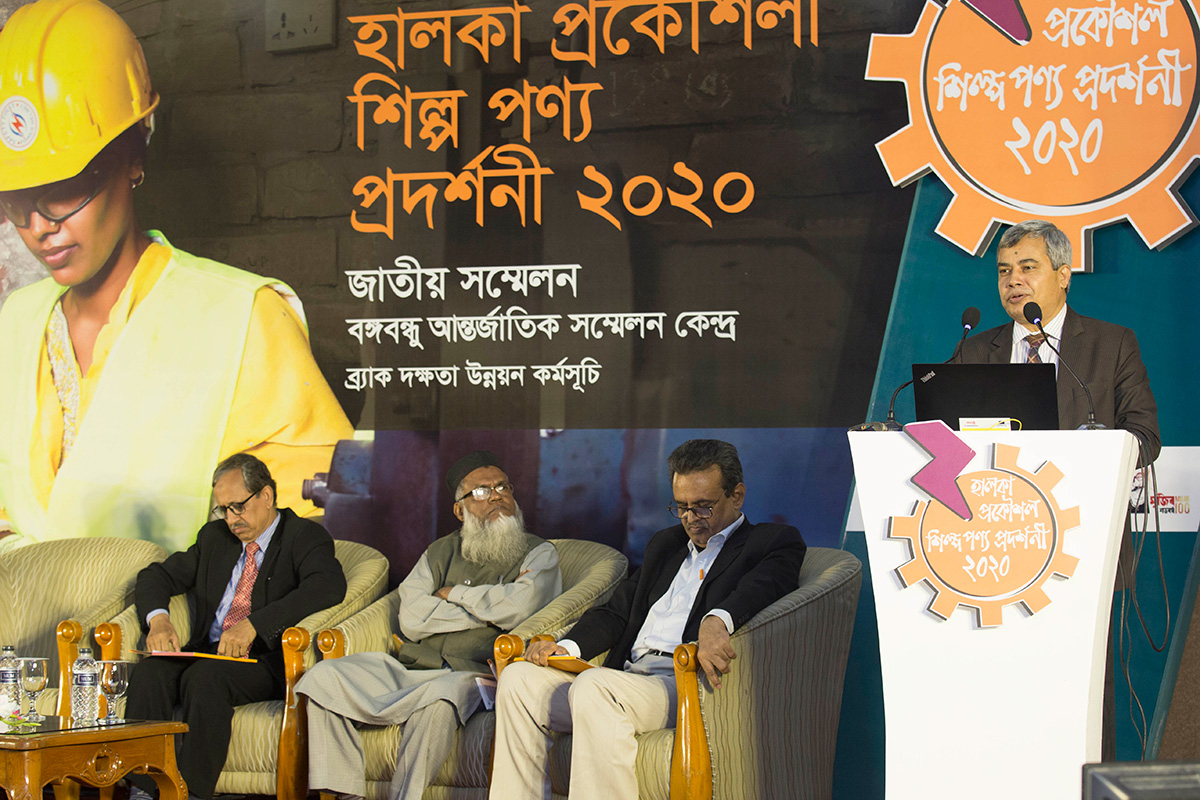
Engaging the youth in productive activities and encouraging them to become entrepreneurs is the best thing we can do to boost the economy. If the youth decide to be entrepreneurs, they will be able to provide livelihood opportunities to the unemployed people and contribute to the economy. Access to finance, technology and skills training are crucial for the light engineering sector to attract the youth.
Experts made these observations on Tuesday, on the final day of the two-day ‘Light Engineering Trade Fair’ organised by BRAC at Bangabandhu International Conference Centre in Dhaka. Director of BRAC Skills Development Programme, Brig Gen Aftab Uddin Ahmed (Retd) chaired the day’s discussion event. The fair was held under BRAC’s ‘PRo-poor Growth of Rural Enterprises through Sustainable Skills-development’ (PROGRESS) project funded by European Union. A total of 58 small businesses participated in the fair from 41 districts and received work orders worth BDT 20 millions.
The three-year PROGRESS project began in February 2017, to support the growth of the country’s light engineering sector by developing dynamic and competitive micro and cottage enterprises.
Inaugurating the event on Monday, Salman F Rahman, Private Industry and Investment Adviser to the Prime Minister, lauded BRAC’s gender-inclusive strategy and stated that public-private partnership is one of the reasons the light engineering sector is flourishing.
“The basic weakness of our economy is our excessive dependence on the readymade garments industry. We have to diversify our export capacity and products in which the light engineering sector will play a crucial role,” he said.
Addressing the event today, Secretary to the Ministry of Industries, Mr Abdul Halim emphasised engaging the youth in productive activities and said that encouraging the youth to become entrepreneurs is the best thing to do to boost the economy.
“Access to finance is a significant area and we need whatever you want in written form so that we can work on the issues entrepreneurs face. I want to thank BRAC for bringing approximately 5,000 light engineering entrepreneurs under the same project. I would request them to keep these people under their umbrella so that they can avail benefits through BRAC. I would also request Bangladesh Small and Cottage Industries Corporation (BSCIC) to enlist these 5,000 entrepreneurs in their database,” he said.
Also present at the event, Mr Mokammel Hossain, Additional Secretary (SDGs) to the Prime Minister’s Office, echoed the chief guest and said if the youth decide to be entrepreneurs themselves rather than running behind jobs, they will be able to provide jobs to the jobless and contribute to the economy.
“Women constitute half of our total population and if they lag behind, the country cannot move ahead. BRAC’s gender policy, women’s inclusion in skills development training, inclusion of women in mainstream employment and disability-inclusive policy is exemplary and praiseworthy,” he added.
President of Bangladesh Engineering Industry Owners Association, Mr Abdur Razzak, pointed out that the government has taken significant initiatives for the light engineering sector and that those are being implemented through the BSCIC.
“Our association, from its experience, has identified five areas that need to be improved in the light engineering sector. Access to finance, technical updates, sustainable training, policy support and a planned industrial park will help the light engineering sector to flourish and help other sectors with its products,” Razzak added.
Speaking on the occasion, Bangladesh Bank General Manager Lila Rashid noted the fact that several of the experts identified access to finance as the decisive factor that is affecting the growth of the light engineering sector.
“This sector is also very important to us and that is why banks allocated 21 percent of their total loans to the SME sector last year and the cottage and small industries received a significant amount of the total disbursement. We believe the light engineering sector has a huge potential to attract finance from the financial institutions,” she said.
A study by the project shows that the business productivity of light engineering workshop owners increased by 29 percent after the project intervention. A total of 500 people received training and support facilities to start their own businesses and among them 223 were female.
Approximately 9,865 youth received apprenticeship-based training, 98.65 percent of them were placed in jobs. 5,182 light engineering workshop owners received technical upgrade training. Besides, 5,289 workshop owners received training on fair work conditions and health and safety at work. 700 market committees received gender awareness and access to finance training.
Effective collaboration, finance, training and tech support will boost light engineering sector

Light Engineering Trade Fair showcases 58 businesses from 41 districts
Diversification of the light engineering sector depends on effective policy support, public-private partnerships, technical and business information, innovation and sustainable development of technology and related products. Capacity development of industries, research and development facilities and removal of other barriers are also needed to boost the sector.
Experts made these observations while speaking on Monday at the inaugural ceremony of the two-day ‘Light Engineering Trade Fair’ organised by BRAC at Bangabandhu International Conference Centre in the capital. The fair is being held under BRAC’s ‘PRO-poor Growth of Rural Enterprises through Sustainable Skills-development’ (PROGRESS) project funded by European Union.
The three-year PROGRESS project began in February 2017, to support the growth of the country’s light engineering sector by developing dynamic and competitive micro and cottage enterprises.
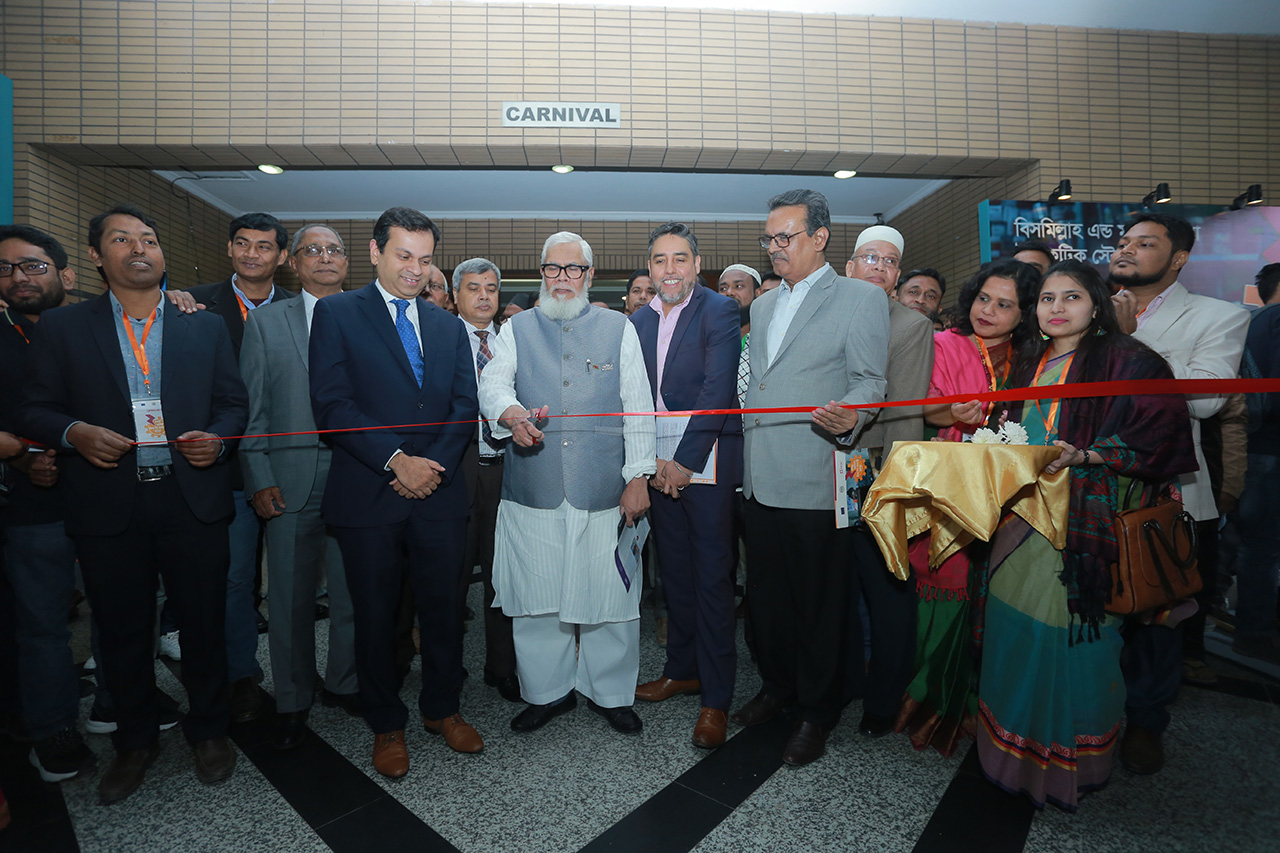
Addressing the event as the chief guest, Salman F Rahman, Private Industry and Investment Adviser to the Prime Minister, lauded BRAC’s gender-inclusive strategy and said public-private partnership is one of the reasons light engineering sector is flourishing.
“The basic weakness of our economy is our excessive dependence on the readymade garments industry. We have to diversify our export capacity and products in which the light engineering sector will play a crucial role,” he said.
Manfred Fernholz, First Secretary of The Food and Nutrition Security and Sustainable Development Section of the European Union Delegation in Bangladesh, urged the government and the financial institutions to extend their support to the small engineering sector.
“The contribution of the light engineering sector measures up to 2.2 percent to Bangladesh’s GDP. Yet the sector has been suffering from lack of tech and financial support, skills development and infrastructure, which in turn makes the sector less competitive.”
Abdur Razzak, President of Bangladesh Engineering Industry Owners Association, observed that import of capital machinery requires only one percent import duty and no vat. “But 15 percent VAT on local production of the same capital machinery has been imposed to be effective from 1 July 2020. We want the VAT to be entirely lifted,” he said.
Chair of the event, Asif Saleh, Executive Director of BRAC, said, “We as an organisation continue to focus skills development in our 2020-2025 strategy as a committed development partner of the Bangladesh government. To effectively grow the skills development sector, Bangladesh must turn around its conventional perception about degree-based education and remove the stigma attached to vocational education,” he added.
Currently, 47 percent of our university graduates are unemployed and the solution lies in skills-based education focusing on the contemporary and future market needs, he said, adding, “Bangladesh government is doing the right thing by prioritising the light engineering sector in Mujib Barsha of 2020.”
A study by the project shows that the business productivity of light engineering workshop owners increased by 29 percent after the project intervention. A total of 500 people received training and support facilities to start their own businesses and among them 223 were female.
Approximately 9,865 youth received apprenticeship-based training, 98.65 percent of them were placed in jobs. Owners of 5,182 light engineering workshops received technical upgrade training. Additionally, 5,289 workshop owners received training on fair work conditions and health and safety at work. Seven hundred market committees received gender awareness and access to finance training.
Women behind the wheel for road safety
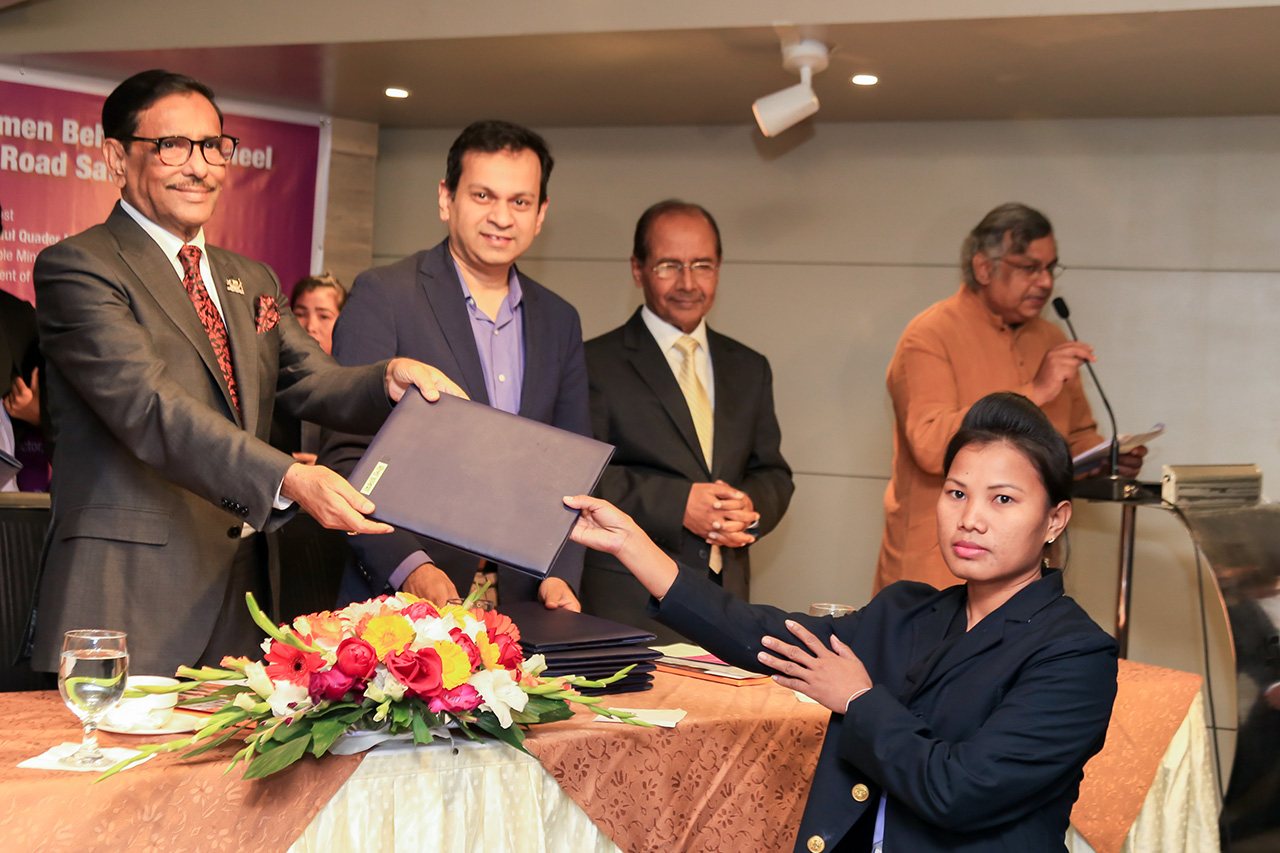
Mr Obaidul Quader, Minister of Road Transport and Bridges, said, “Women drive vehicles abiding by the rules and in a calm manner. They are usually not substance abusers. They do not talk on mobile phones while driving. So the more women will be appointed as professional drivers, the lesser will be the risks of road accidents.”
The minister’s comment came today on Saturday (25 January) as he was addressing an audience as the chief guest of a ceremony to hand out certificates to women who successfully completed a course at BRAC Driving School in Dhaka city. Ms Kazi Rowshan Akhter, Secretary of the Ministry of Women and Children’s Affairs, attended the event titled ‘Women behind the wheel for road safety’ as special guest. Mr Asif Saleh, executive director of BRAC, chaired the ceremony.
BRAC’s initiative to train women as professional drivers to promote both road safety and women-friendly commuting system has drawn praise at home and abroad. This ceremony was organised for the 8th batch of learners in which 11 women enrolled and all of them passed and received driving licences. The 3-month training was conducted at BRAC Learning Centre at Uttara in the capital.
The ceremony began with one-minute silence paying tribute to the memory of BRAC’s founder Sir Fazle Hasan Abed. The main event started with a presentation titled ‘Women behind the wheel for road safety’ by Mr Ahmed Najmul Hussain, director of BRAC Administration and Road Safety Programme. According to the presentation, BRAC started its driving school in 2011, mainly to train people from disadvantaged families to produce skilled and quality professional vehicle drivers. Its 3-month residential course curriculum includes basic driving skills, safe driving techniques, basic repairs skills and professional conduct.
Mr Obaidul Quader further said in his speech, “We want other institutions to come forward to help women gain self-dependence. The aim of these initiatives will simply go in vain if women fail to get jobs even after successfully completing such several-month long courses. So both the government and private sectors have to clear their way to recruit women drivers. The government will consider this issue with more importance from now on.”
Kazi Rowshan Akhter in her secretary’s speech said, “It is also from a BRAC’s research we have learned that 94 percent women public transport users face one or other kind of sexual harassment. Women drivers in our country also deal with many kinds of challenges. We have to join hands in finding the roots of those challenges as well as the solutions.”
Ms Mercy Miyang Tembon, country representative of World Bank for Bangladesh and Bhutan, noted writer and researcher Mr Syed Abul Maksud, BRAC’s director Ms Anna Minj and representatives from Gono Shasthya Kendra, Nirapad Sarak Chai movement and road transport owners association were also present at the event.
Organisers further said BRAC Driving School so far trained 7,388 individuals in basic driving among which 1,973 are women. It trained 10,373 in professional driving of which 214 are women. A total of 599 women received training in motorbike driving. A large number of graduates from the BRAC Driving School are successfully working for different local, international and corporate organisations.
Since 2011, under BRAC’s community road safety awareness programme, over 1.2 million people have received training on safe use of roads. Also 5,451 schoolteachers and 498,000 schoolchildren received special awareness training on safe road use.
BRAC’s executive director Mr Asif Saleh in his chair’s speech said, “BRAC is considering taking its driving training school to every division and district of the country. BRAC also wants to establish a road safety institute. BRAC will continue its collaborative work with the government in future to ensure road safety, particularly to create a women-friendly road and transport system.”
Dr Charles Chen Yidan, Founder of Yidan Prize, presents the prestigious award to Sir Fazle's family in Dhaka, Bangladesh

(23 January 2020, Dhaka) Dr Charles Chen Yidan, founder of the Yidan Prize, visited Dhaka, Bangladesh, this week to present the prestigious award. Ms Tamara Abed and Mr Shameran Abed, children of Sir Fazle Hasan Abed, accepted the award on his behalf at BRAC head office in Dhaka.
Dr Yidan presented the gold medal of the award to Ms Tamara Abed, his daughter and also the managing director of BRAC Enterprises and chairperson of the board of trustees of BRAC University. The certificate of the award was presented to Mr Shameran Abed, his son and also the senior director of BRAC Microfinance and Ultra-Poor Graduation Programme, at a ceremony organised on this occasion.
Sir Fazle was awarded the Yidan Prize for Education Development for his groundbreaking work on education in September 2019. During a visit to Sir Fazle in October 2019, the Yidan Prize Foundation learned directly from this iconic figure in international development about his visionary approach and pivotal role in changing the course of education in Bangladesh.
After Sir Fazle’s passing on 20 December 2019, Dr Charles Chen Yidan decided to visit Dhaka to pay his respect and present the award in person to his family. He also visited a BRAC school in the Korail slum in Banani and an early childhood development (ECD) centre - Play Lab in Banasree during his two-day visit to the city.
“Sir Fazle lived a life of service with true compassion, courage and conviction. He inspired everyone around him to choose optimism over despair and to believe in the potential of the human spirit. I believe that Sir Fazle will continue to be a source of inspiration for the world. The hundreds of millions of lives he transformed, especially those from the most vulnerable and poorest communities, will remember him as the spark of hope. The Yidan Prize Foundation will continue to work closely with BRAC to further scale up impactful educational programmes in Asia, Africa and beyond. Together, we can continue to help young, marginalised children find joy in their learning, and that those deprived of resources live happy and productive lives,” Dr Charles Chen Yidan said at the award ceremony.
Mr Shameran Abed read out the acceptance speech Sir Fazle drafted last year after the announcement of the prize.
“I would like to express my gratitude for the recognition bestowed upon both BRAC and me. The very generous Yidan Prize funding will allow us to expand our education activities further. I believe that education is the greatest equaliser. I envision a world where even the poorest among us have the opportunity to lead lives of purpose and dignity. I humbly request everyone to play their part in making this vision a reality,” Sir Fazle drafted in the speech.
“We are most honoured to receive the Yidan Prize on behalf of our father,” said Ms Tamara Abed. “We are committed to carry his legacy forward,” she added.
Sir Fazle always viewed education as a crucial catalyst for change. He firmly believed that it is about more than just schools and books. Play-based joyful learning is a cornerstone of BRAC's approach. BRAC has set up more than 1,400 play-based early childhood development centres across Bangladesh, Tanzania and Uganda, where close to 40,000 children aged 1 to 5 years are presently enrolled. In these centres pre-school children have access to age-appropriate play materials, a play-based curriculum and play spaces that ensure their holistic development.
As a Yidan Prize Laureate, Sir Fazle received a gold medal, a certificate and HK$30 million (around US$3.9 million), half of which is a cash prize and the other half a project fund.
“Addressing the needs of children in the most disadvantaged communities has always been a core priority for BRAC. The Yidan prize will support us in scaling up our play-based early childhood development solutions in Uganda and Tanzania and develop a new model of play-based childcare in Bangladesh”, Mr Asif Saleh, executive director of BRAC, commented.
The Yidan Prize project funding (approximately US$2 million) will be invested by BRAC in research, innovation and scaling up high-impact solutions related to early childhood development in the next three years. BRAC will also use part of the project fund to pilot a social enterprise of play-based childcare model in Bangladesh.
About the Yidan Prize
Founded in 2016, by Dr Charles Chen Yidan, a core founder of Tencent, the Yidan Prize has a mission of creating a better world through education. It consists of two awards, the Yidan Prize for Education Research and the Yidan Prize for Education Development. Yidan Prize Laureates each receives a gold medal and certificate, and a total sum of HK$30 million (around US$3.9 million), half of which is a cash prize while the other half is a project fund. To ensure transparency and sustainability, the prize is managed by the Yidan Prize Foundation and governed by an independent trust with an endowment of HK$2.5 billion (around US$323 million). Through a series of initiatives, the prize aims to establish a platform for the global community to engage in conversations around education and to play a role in education philanthropy.
About BRAC
BRAC is a global leader in developing cost-effective, evidence-based programmes, and has been ranked the #1 NGO in the world for the last four years consecutively by NGO Advisor. BRAC’s vision is a world free from all forms of exploitation and discrimination where everyone has the opportunity to realise their potential. Founded in Bangladesh in 1972, BRAC acts as a catalyst, creating opportunities for people to transform their lives. BRAC uses an integrated model to change systems of inequity, through social development programmes, humanitarian response, social enterprises, socially responsible investments and a university. BRAC operates in 11 countries across Asia and Africa.
BRAC and KfW jointly launch the 'Climate Bridge Fund'
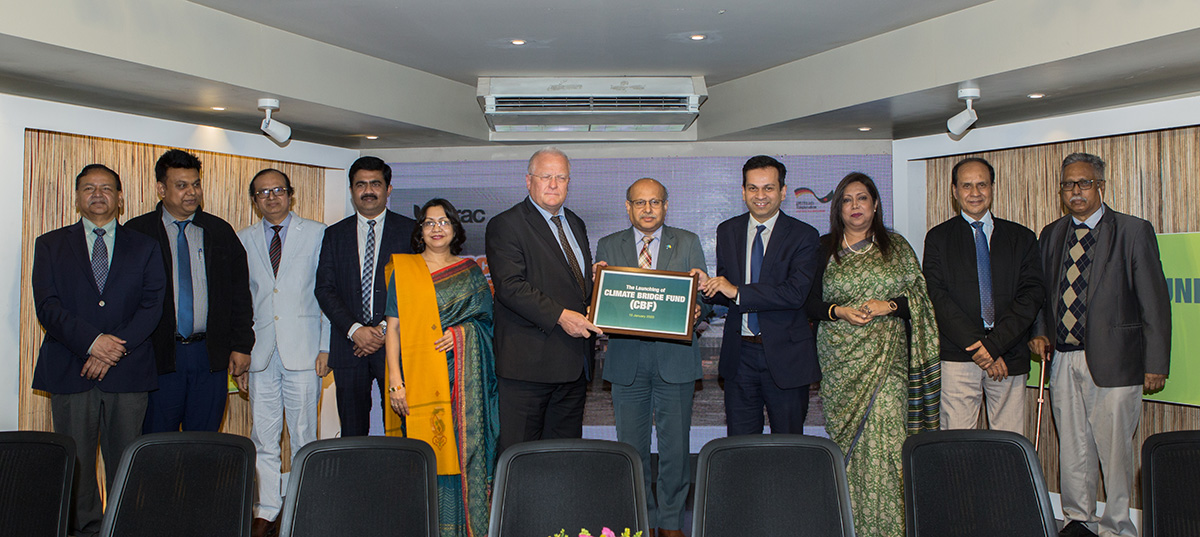
BRAC and the German Development Bank (KfW), on behalf of the German Government have jointly launched a trust fund titled 'Climate Bridge Fund' on 15 January 2020, with an initial amount of 11.735 million Euro.
The 'Climate Bridge Fund' has been developed through a collaboration between the two organisations with the objective of strengthening the resilience of climate vulnerable communities in Bangladesh. The Fund was initiated in November 2019, and is now ready to start its activities.
At the core of the 'Climate Bridge Fund' activities will be vulnerable people in urban areas who are either displaced or at risk of being displaced due to the impacts of climate change. In the beginning, the Climate Bridge Fund will concentrate its support to vulnerable communities in Khulna, Barishal, Rajshahi, Satkhira and Sirajganj.
The individual projects will be undertaken by NGOs with expertise in urban slum areas which can apply for funding at the Climate Bridge Fund. Within a defined budget limit, BRAC will also implement projects with the funding of the Fund.
As the chair of the launching event; Asif Saleh, Executive Director, BRAC, said “Climate change is a critical challenge globally, and this will be the key focus of BRAC for the next five years. This fund is a unique initiative for Bangladesh which will encourage and enable sustainable operations as well as scaling up of traditional development projects into climate change projects”.
The launching event was held at the city's BRAC Centre Inn, where several high government officials, as well as members from different national and International NGOs and donor communities were present.
While addressing the event, Anirban Kundu, Country Director, KfW Development Bank said, 'KfW is proud to establish the Climate Bridge Fund together with BRAC. It is going to provide long term financing gaps in local level adaptations in urban areas'.
According to Comprehensive Disaster Management Programme (CDMP II) 2014, one in every seven people in Bangladesh will be displaced due to climate change by 2050.
Many urban centres across the country will experience the challenges of a growing population due to climate-induced migration. People in rural areas, especially those living in poverty, will experience livelihood crises due to the adverse effects of climate change on natural resources and ecosystems. There is a significant statistical relationship between outmigration of farmers and global temperature, it reads.
The 7th Five Year Plan (7FYP) of the Government of Bangladesh states that the number of urban slums and people living in them will increase due to internal migration. This rapid inflow of migrants into slums will create a pressure of additional demands on basic services - employment opportunities, housing, water supply and sanitation, health, education, drainage and other infrastructure and facilities in all urban centres. These centres include Khulna, Barishal, Rajshahi, Satkhira and Sirajganj.
Regarding reducing the vulnerability of climate-induced displaced communities, H.E. Peter Fahrenholtz, Ambassador, Embassy of the Federal Republic of Germany said, 'Germany is committed to continue financing adaptation in LDCs and Emerging Countries.'
The life and livelihoods of people living in urban slums are becoming even more vulnerable without access to these basic services and exposure to various hazards - floods, waterlogging, heat waves, cold waves, droughts, cyclones and storm surges, salinity intrusion in ground/surface water, drainage congestion, and outbreaks of climate sensitive diseases.
Sir Fazle Hasan Abed laid to rest: His life was an incredible gift to humanity
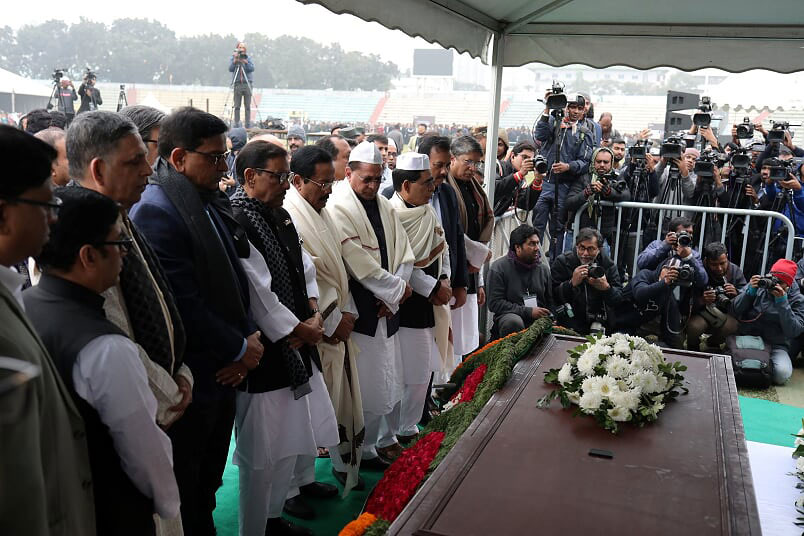
The founder of BRAC, Sir Fazle Hasan Abed has been laid to rest today, Sunday, 22 December 2019 at the Banani graveyard in Dhaka city. Thousands of people from all walks of life paid their last tributes and participated in his Namaz-e Janaza prior to the burial.
People began to gather from the morning at the Army Stadium premises. The vehicle carrying Sir Fazle's body arrived at 10.30am. Major Ashiqur Rahman, private secretary to military secretary to the Honourable President, and Colonel Md Saif Ullah PSC, deputy military secretary to the Honourable Prime Minister, placed wreaths at the coffin on behalf of the head of state and head of government respectively.
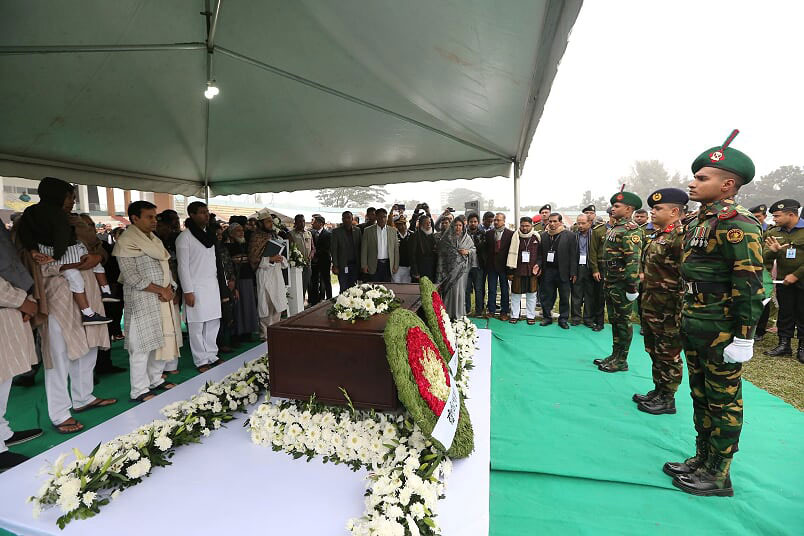
Immediately after, Dr Shirin Sharmin Chaudhury, Honourable Speaker, and Fazle Rabbi Miah, Honourable Deputy Speaker of National Parliament paid their tributes, followed by Chief Election Commissioner KM Nurul Huda.
Obaidul Quader, Honourable Minister for Road Transport and Bridges and General Secretary of Bangladesh Awami League, led a group on behalf of his party in paying homage. The group included central leaders, among whom were party joint general secretary Mahbubul Alam Hanif, senior leaders Jahangir Kabir Nanak and AFM Bahauddin Nasim and Jubo League Chairman Sheikh Fazle Shams Parash.
Mirza Fakhrul Islam Alamgir, General Secretary, BNP, accompanied by senior leader Amir Khasru Mahmud Chowdhury and others paid homage on behalf of the party. Rashed Khan Menon, President, Workers' Party of Bangladesh, Shirin Akhter, General Secretary, Jatiya Samajtantrik Dal, Anisul Islam Mahmud, lawmaker from Jatiya Party placed wreaths on behalf of their respective political organisations.
Dignitaries also spoke to the media about Sir Fazle as they paid their last tributes.
Obaidul Quader, General Secretary of Bangladesh Awami League:
“He has left behind an irreplaceable gap. He can only be compared to himself. Sir Fazle Hasan Abed had always been one to avoid the spotlight. He spread various social interventions across every level of society in silence and humility. BRAC's programmes have spread to every corner of Bangladesh and even beyond. He established many kinds of organisations that have been working to the benefit of the grassroots people. His contributions will last forever. The nation will forever remember in respect.”
Mirza Fakhrul Islam Alamgir, General Secretary, BNP:
“Sir Fazle Hasan Abed will forever live in the golden memory of people for his great contributions to change the world, particularly in establishing the rights of women.”
Professor Muhammad Yunus, Founder, Grameen Bank:
“He was the kind of person who was not an expert but still went on to do incredible work from sheer willpower. There is a great lesson there for the younger generation. I would implore the youth of today to take these lessons and learn to stand tall through the trials of life.”
Dr Anisuzzaman, Professor Emeritus, University of Dhaka:
“My friendship with Fazle Hasan Abed goes back to the year of 1972. I have closely observed his work. When he started his relief organisation in 1972, we never thought his efforts will spread all over the world. There was immense dedication in him. Every work that he took on, he made sure to complete it with beautiful perfection.”
Atiqul Islam, Mayor, Dhaka North City Corporation:
“Before he went to do anything, he first understood the whole of it, he went to the field and made sure that things were implemented just according to the plan.”
Earl R Miller, U.S. Ambassador to Bangladesh:
“He helped raise people out of poverty, inspired and improved the lives of millions of people not in Bangladesh only, but around the world.”
Jamilur Reza Choudhury, Professor
“He would invite the best of teachers, those who would be able to advise him the best. There is a saying, small is beautiful. He added to it: ‘Large is essential.’ Remaining small isn’t enough - expansion is needed. He applied this model everywhere.”
Sara Zaker, Theatre Actor and Executive Vice Chairperson, Asiatic Experiential Marketing Ltd:
“His door was open whenever I went to him for advice. He was a people’s man. I have never worked at BRAC but have been involved in some of their activities. I want to remember him as Abed bhai as I have always known him. Bangladesh has lost an irreplaceable asset.”
Other dignitaries, government officials, local and international organisations who were present:
Government organisations and present and former government officials
Salman F Rahman, Political Adviser to the Prime Minister; Tawfiq-e-Elahi Chowdhury, Energy Adviser to the Prime Minister; Md Shahab Uddin, Minister for Environment and Forest; Microcredit Regulatory Authority; ATM Shamsul Huda, former chief election commissioner.
Political leaders
Dr Kamal Hossain, eminent lawyer and politician; Enam Ahmed Chowdhury, senior Awami League leader; Sheikh Fazle Noor Taposh MP; Akbar Ali Khan and AB Mirza Azizul Islam, former advisers to Caretaker Government; Abul Maal Abdul Muhith, former finance minister Bangladesh Chhatra League Dhaka University branch.
Ambassadors
Ambassadors of Spain and USA to Bangladesh.
International organisations
International Rice Research Institute (IRRI), UNDP, UNICEF, UN Bangladesh.
NGOs and corporates
Dr Zafrullah Chowdhury, founder of Gonoshasthaya Kendra; Rasheda K Chowdhury, Chairperson Gono Shakkhorota Ovijan; Shipa Hafiza, Executive Director, Ain o Shalish Kendra; Aroma Dutta MP, Executive Director, PRIP Trust; UCEP Bangladesh; CARE; Proshika; TMSS; Safer World; Dustho Shasthya Kendra; BURO Bangladesh; Badiul Alam Majumder, Secretary, SHUJAN; Federation of NGOs in Bangladesh (FNB); CDF; Action Bangladesh; Oxfam; ALRD; VARC; Maya website; ASA; Ubinig and Nari Grantha Prabartana; Concern Worldwide; Shakti Foundation; Bastab; Grameen Phone.
Social organisations, intellectuals, artist, writers
Abul Khair Litu on behalf of Gyantaposh Abdur Razzaq Foundation; Luva Nahid Chowdhury on behalf Bengal Foundation; Bangladesh Sthapati Institute; Monirul Islam and Hashem Khan, eminent painters; Shahidul Alam, eminent photographer and founder of Drik; Liberation War Museum; Bangmoy.
BRAC family
Professor Mohammad Tamim, BRAC University Pro-Vice Chancellor; Ahsan H Monsur, Chairman, BRAC Bank; BRAC Net; IPDC; Guardian Life Insurance; Bkash; Baniachang Aysha Abed Foundation.
The Namaz-e Janaza was held at 12.30pm led by Moulana Ahsanullah, Imam of Gulshan Central Mosque.
His body was taken to Banani graveyard afterwards, where another Namaz-e Janaza was held. He was laid to rest at 2.30pm.
Earlier in the morning, Sir Fazle's body was taken to BRAC Centre, his long-time workplace. His relatives and colleagues paid respects to him and participated in his first Namaz-e Janaza on the office premises at 9.45am. Afterwards, his body was taken to the Army Stadium.
Books of condolences
A book of condolence in memory of Sir Fazle was opened at 2pm on Sunday at BRAC Centre. From Monday, 23 December, books of condolences will be open at Aarong outlets, BRAC Bank offices and BRAC University. From Tuesday, 24 December, books of condolences will be open at all BRAC regional offices. All the condolence books will remain open from 10am to 5pm until 30 January, 2020.
BRAC Founder Sir Fazle Hasan Abed KCMG passes away

With profound sadness, BRAC, one of the world’s leading development organisations, announced today the passing of its Founder, Sir Fazle Hasan Abed KCMG. He was 83 years old.
Sir Fazle breathed his last this evening while undergoing treatment at the Apollo Hospitals in Dhaka, Bangladesh. He was battling a malignant tumour of the brain.
His body will be placed on the Army Stadium premises in the capital on Sunday (22 December) from 10.30am to 12.30pm to allow people from all walks of life to pay their last tributes. His Namaz-e-Janaza will also be held there at 12.30pm. He will be laid to rest at the graveyard in Banani, Dhaka on the same day.
Ms Ameerah Haq, Chair, BRAC Global Board said in a statement, “Unfaltering dedication, focus and work ethic are what we have always experienced in Sir Fazle, or Abed Bhai, as the BRAC family calls him lovingly. He always put others before himself and let his work speak for itself. Even when BRAC attained its global stature, his concern and focus were on the less fortunate in society and those whose potential needed nurturing. He embodied the highest level of integrity, humility and humanity, which continues to be the essential guiding spirit of BRAC.”
The Honourable President of Bangladesh Mohammad Abdul Hamid and Prime Minister of Bangladesh Sheikh Hasina both expressed their heartfelt condolences to the bereaved family of Sir Fazle Hasan Abed.
Sir Fazle started BRAC in 1972, at the age of 36, as a small relief and rehabilitation project in north-eastern Bangladesh. Over the past 47 years, BRAC has grown to be one of the most effective non-governmental organisations in the world, touching the lives of over 100 million people worldwide. BRAC is a unique ecosystem comprising development programmes, microfinance, social enterprises, a university, bank and a range of mission-aligned investments. BRAC currently operates in 11 countries in Asia and Africa, with affiliate offices in the USA, UK and the Netherlands.
About Sir Fazle Hasan Abed
Sir Fazle was born in 1936 in Bangladesh. He studied Accountancy in London, qualifying as a Cost Management Accountant in 1962. While he was working as a senior corporate executive at Pakistan Shell Oil, the 1970 cyclone and 1971 Liberation War in Bangladesh dramatically changed the direction of his life. He left his job and moved to London, where he helped initiate Action Bangladesh and HELP Bangladesh in support of the Liberation War.
Early in 1972, after the war was over, he returned to the newly-independent Bangladesh, finding the economy in ruins. The return of 10 million refugees who had sought shelter in India during the war called for urgent relief and rehabilitation efforts. Sir Fazle established BRAC to address the needs of refugees in a remote area of north-eastern Bangladesh, guided by a desire to help people living in poverty develop their own capacity to better manage their lives.
Today BRAC is one of the largest NGOs in the world, operating across eleven countries in Africa and Asia. Its primary objective is to empower people living in poverty and inequality. In 2019, for the fourth year in a row, BRAC was ranked first among the world’s top 500 NGOs by Geneva-based NGO Advisor; based on its impact, innovation and sustainability.
Sir Fazle was honoured with numerous national and international awards for his achievements in leading BRAC, including the Yidan Prize for Education Development (2019), LEGO Prize (2018), World Food Prize (2015), Spanish Order of Civil Merit (2014), Inaugural WISE Prize for Education (2011), David Rockefeller Bridging Leadership Award (2008), Inaugural Clinton Global Citizen Award (2007), UNDP Mahbubul Haq Award for Outstanding Contribution to Human Development (2004), Olof Palme Prize (2001) and Ramon Magsaysay Award for Community Leadership (1980).
He has also been recognised by Ashoka as one of the ‘global greats’; and is a founding member of its prestigious Global Academy for Social Entrepreneurship. He was a member of the Commission on Health Research for Development (1987-90), the Independent South Asian Commission on Poverty Alleviation (1991-92) and the High-level Commission on Legal Empowerment of the Poor (2005-2008). In 2010, he was appointed Knight Commander of the Most Distinguished Order of St. Michael and St. George by the British Crown in recognition of his services to reducing poverty in Bangladesh and internationally. Sir Fazle was a member of the Group of Eminent Persons appointed by the UN Secretary-General in 2010 to advise on support for the Least Developed Countries. In 2014 and 2017, he was named in Fortune Magazine’s List of the World’s 50 Greatest Leaders. Sir Fazle was honoured with a Dutch Knighthood in 2019.
Please see the condolence message from Ms Ameerah Haq, Chair, BRAC Global Board.
Nippon Foundation donates USD 2 million to BRAC
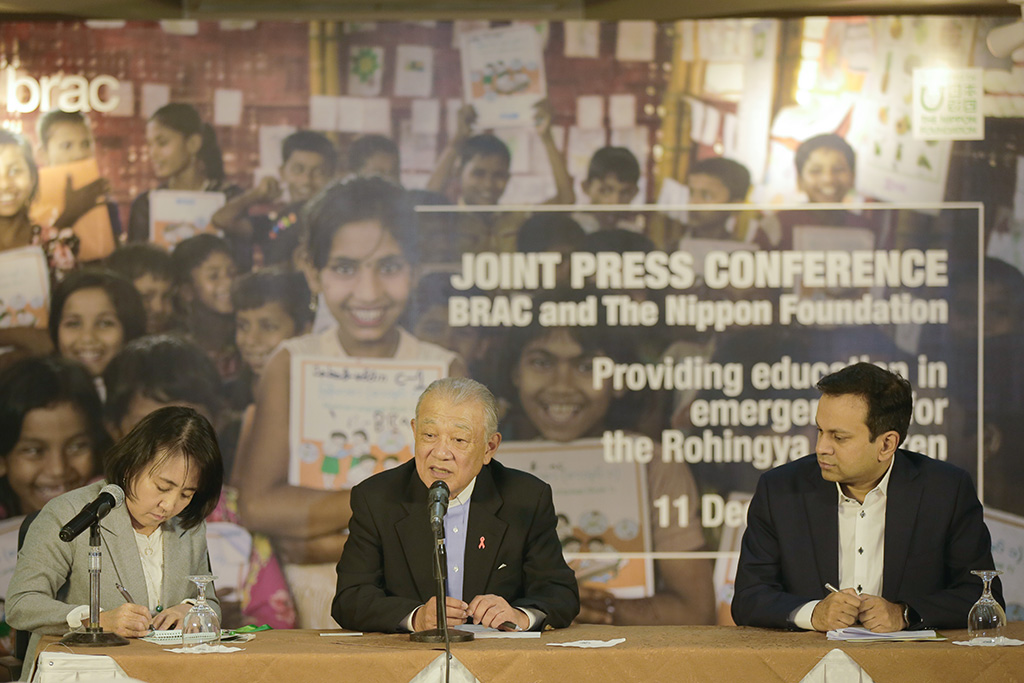
The Nippon Foundation, a Japanese private non-profit organisation, will donate USD 2 million (over BDT 169 million) for BRAC to scale up its education programme for the displaced Rohingya and host communities’ children in Cox's Bazar. The grant will help build 50 two-story prefabricated movable steel structures to be used as learning centres for 8,000 displaced Rohingya children. Besides, 100 pre-primary learning centres will also be built for the host community’s children.
BRAC and The Nippon Foundation announced the partnership at a press conference today on Wednesday (11 December) at BRAC Centre in Dhaka city. Chairman of The Nippon Foundation, Yohei Sasakawa, Executive Director of BRAC, Asif Saleh, Director of BRAC Education Programme, Dr Safiqul Islam, officials of the two organisations and Japanese Embassy in Bangladesh were present at the event.
Chairman Yohei Sasakawa said, "The objective of our initiative is to create education opportunities for the displaced Rohingya children so that they can also learn alongside the host community’s children. We hope that the displaced Rohingya children will be able to continue learning as they return to their homeland."
BRAC’s Executive Director Asif Saleh said, "55 per cent of the people who came from Myanmar are children. So we are focusing on their education."
Officials of BRAC informed the press that right from the beginning of the new influx of the displaced Rohingya people into Bangladesh in 2017, BRAC undertook the education programme for their children as the largest partner of the government in this regard. The learning curriculum for the displaced Rohingya children includes pre-primary education, alphabets and numbers, life-saving information, psychological counselling and life skills development. BRAC is also developing education materials for classes I-IV for the displaced Rohingya children.
Currently, over 61,000 children of 4-14 years of age are receiving basic education in its 759 learning centres at the Rohingya camps in Ukhya and Teknaf sub districts of Cox's Bazar. Fifty-one per cent of these children are girls. 722 children are disabled among them. Also, 57 per cent members of the managing committees of these learning centres are women.
The separate 100 pre-primary learning centres BRAC will build with The Nippon Foundation's support will accommodate 3,000 host community children of 5-6 years of age.
Professor Mushtaque Chowdhury made adviser to FAO
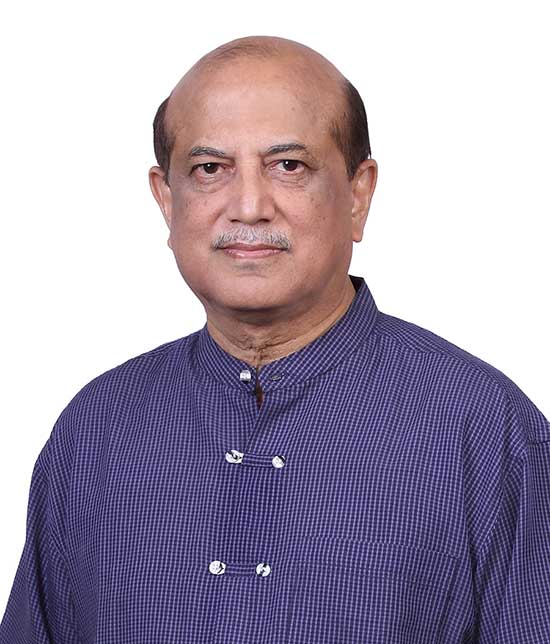
Professor Mushtaque Chowdhury, Advisor and Founding Dean of the BRAC James P Grant School of Public Health, BRAC University, has been made a member of the Management Advisory Group for the Director General of the UN Food and Agricultural Organization (FAO) in Rome. In a recent letter to Dr Chowdhury, Dr Qu Dongyu, the new Director General of FAO, said, “I will count on your frank advice and positive feedback in supporting FAO to further strengthen its activities in assisting countries to realise the potential of their agriculture and food systems. Together, we will work to create a more prosperous world for all. Your experience and insight will contribute greatly to this joint effort”. FAO is a specialised agency of the United Nations that leads international efforts to defeat hunger.
Dr Chowdhury is also a Professor of Population and Family Health of Columbia University in New York. He is a Senior Fellow of Bangladesh Institute of Development Studies (BIDS) and a Senior Adviser to the International Growth Centre of the London School of Economics. He made significant contributions to the academic sector by publishing over 200 scientific papers in different national and international journals. One of his co-edited books, ‘From the Ground Up: BRAC’s contributions to agricultural development in Bangladesh and beyond’, published by the University Press Limited, was formally launched in Dhaka last week.
More...
Join the world’s biggest family

